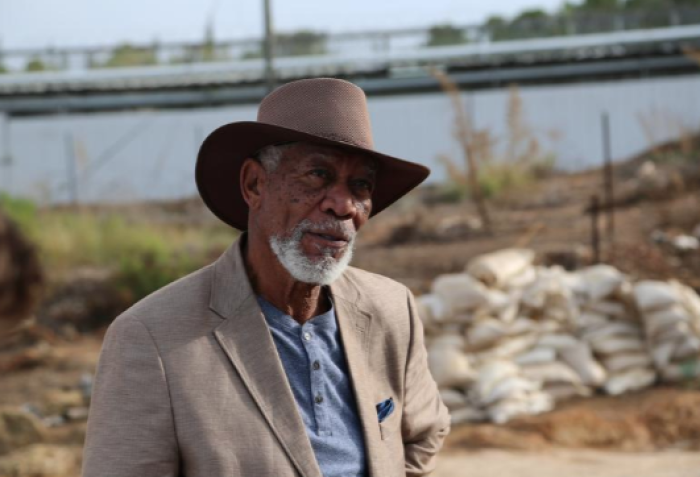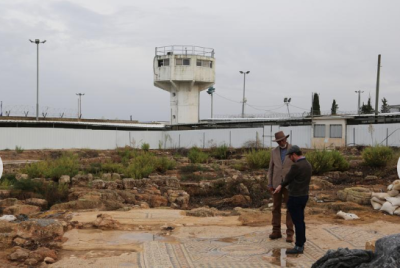Morgan Freeman’s ‘Story of God’ explores archaeology and Jesus as God

Warning: This article contains spoilers.
The divinity of Christ will be highlighted by Morgan Freeman on national television Tuesday.
The third season of National Geographic's "The Story of God with Morgan Freeman" premiered this month and in episode two, airing Tuesday night, the Academy Award-winning actor embarks on a journey to discover the “gods among us,” where he highlights evidence that early Christians recognized Jesus as God.
Freeman kicks off the episode reminding viewers that the role of God has followed him as an actor throughout his 50-year career. But now he’s taking viewers through those various deities that some believe walked the earth.
“Jesus is not the only example of human incarnation of God. The Egyptian pharaohs, the emperors of the Inca were all considered divine. Makes you wonder, why do people want to see God walk among us?” Freeman says in the show.
The actor then journeys to discover how different faiths see God taking human form.
“There is one God on the earth whose followers number in the billions,” Freeman says before talking about Jesus Christ.
The episode starts with a visit to Bethlehem at the Church of the Nativity, where a Franciscan priest takes Freeman to the supposed spot where Roman emperor Constantine's mother, Helena, believed Jesus was born.
He then travels to an Israeli prison where there was a discovery of ancient archaeological evidence.
“I needed to understand when Jesus the preacher, Jesus the rabbi came to be seen as divine Jesus,” Freeman says of his reason for traveling to this prison in Israel.
There, he is given access to an archaeological discovery “so important” that it was completely barricaded.
In 2005, archaeologists discovered proof of the first time Jesus was hailed a God on the grounds of this high-security Israeli prison in Megiddo. Scholar of comparative religion Dr. Yanatan Moss was in charge of giving Freeman a tour of the excavation.

The site was discovered to be a Christian prayer hall with a mosaic on the floor which honored Jesus. The writings on the ground revealed that a female follower of Jesus dedicated a table (altar) to “the God, Jesus Christ.”
“As suggested by the letters of the Apostle Paul many of the early church leaders were women,” Freeman explains when discovering that the mosaic features a woman's name.
Moss explains, “In the early centuries because Christianity was an underground, counter-cultural movement it was often the people who were in a subjugated position in society who accepted Christianity earlier than people in position in power.”
“This site would seem to give us the voice of these ancient Christian women and what they believe about Christ, It’s explicitly stated here, the people living here in this village in the third century they understood Christ to be divine.”
“Christ as God,” Freeman echoes.
The “incredible discovery” of the ordinary house floor revealed that 1,800 years ago Christians gathered there to worship Jesus as God. That is a belief Christians around the world hold to this day, hailing the Messiah as one of the three persons in the Trinity — Father, Son and Holy Spirit.
Freeman then answers his question from earlier in the program.
“The dominant voice being women played a part in transforming Jesus the rabbi, Jesus the prophet, into Jesus the God, God made flesh,” he says.
“I would argue this transformation that has given Christianity its longevity. Billions of souls follow the teaching, not of a man but of God. God on earth.”
Freeman further examines other “gods among us,” who “frequently come and go.” He visits a Kumari deity, a young girl who reigns as a Hindu goddess, a medium, the Rastafarian leader Haile Selassie and more.
Season 3 of “Story of God with Morgan Freeman” features six episodes that “take viewers on an interfaith journey around the globe, traveling to 30 different cities of historical and anthropological importance, including Jerusalem, Kathmandu, Jericho, Rome, Bethlehem, Paris, Prague, Hanoi, Toronto and Lourdes.
"The series’ filmmakers met with 13 religious experts, eight priests, three druids, three shamans, one imam, one rabbi, one former executioner, one nun, two 'living goddesses' and hundreds of monks. The series interviews believers of many faiths including Christians, Jews, pagans, druids, Muslims, Hindus, Jains, animists, Buddhists and agnostics,” the show’s synopsis reads.
Visit National Geographic for more information on “The Story of God with Morgan Freeman.”




























